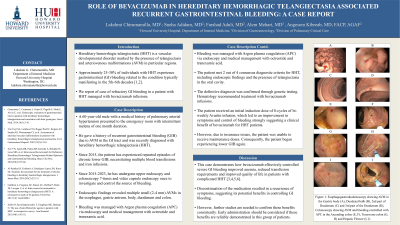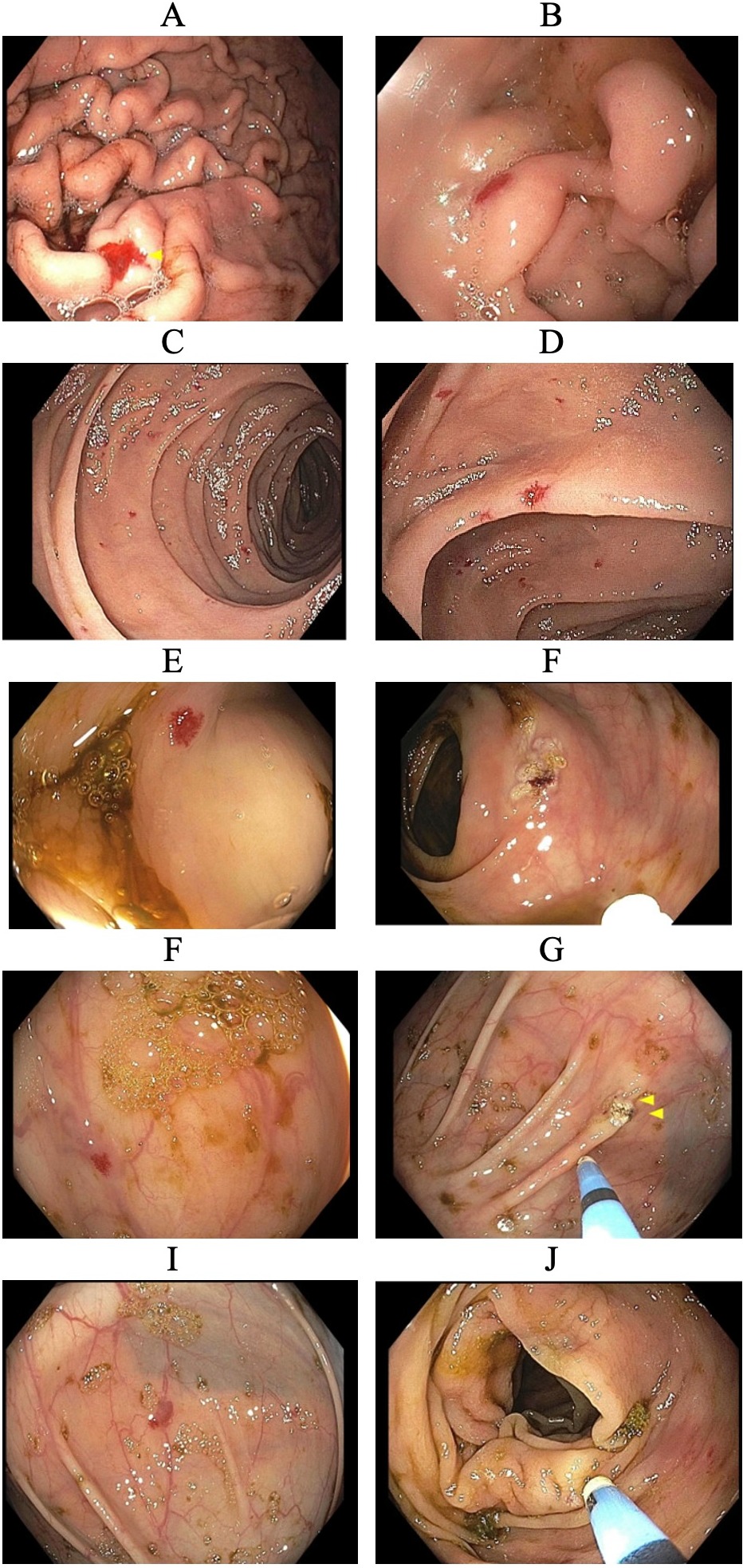Sunday Poster Session
Category: GI Bleeding
P0778 - Role of Bevacizumab in Hereditary Hemorrhagic Telangiectasia Associated Recurrent Gastrointestinal Bleeding: A Case Report
Sunday, October 27, 2024
3:30 PM - 7:00 PM ET
Location: Exhibit Hall E


Lakshmi Chirumamilla, MD
Howard University Hospital
Herndon, VA
Presenting Author(s)
Lakshmi Chirumamilla, MD1, Sneha Adidam, MD2, Farshad Aduli, MD2, Alem Mehari, MD2, Angesom Kibreab, MD2
1Howard University Hospital, Herndon, VA; 2Howard University Hospital, Washington, DC
Introduction: Hereditary hemorrhagic telangiectasia (HHT) is a vascular developmental disorder marked by the presence of telangiectasis and arteriovenous malformations (AVM) in particular regions. Approximately 25-30% of individuals with HHT experience gastrointestinal (GI) bleeding related to the condition typically manifesting in the 5th-6th decades [1,2]. We report of case of refractory GI bleeding in a patient with HHT managed with bevacizumab infusions.
Case Description/Methods: A 60-year-old male with a medical history of pulmonary arterial hypertension presented to the emergency room with intermittent melena of one month duration. He gave a history of recurrent gastrointestinal bleeding (GIB) due to AVM in the GI tract and was recently diagnosed with hereditary hemorrhagic telangiectasia (HHT).
Since 2015, the patient has experienced repeated episodes of chronic lower GIB, necessitating multiple blood transfusions and iron infusions. Since 2015-2023, he has undergone upper endoscopy and colonoscopy 7-times and video capsule endoscopy once to investigate and control the source of bleeding. Endoscopic findings revealed multiple small (2-4 mm) AVMs in the esophagus, gastric antrum, body, duodenum and colon. Bleeding was managed with Argon plasma coagulation (APC) via endoscopy and medical management with octreotide and tranexamic acid.
The patient met 2 out of 4 consensus diagnostic criteria for HHT, including endoscopic findings and the presence of telangiectasia in the oral cavity. The definitive diagnosis was confirmed through genetic testing. Hematology recommended treatment with bevacizumab infusions. The patient received an initial induction dose of 8-cycles of bi-weekly Avastin infusion, which led to an improvement in symptoms and control of bleeding strongly suggesting a clinical benefit of bevacizumab for HHT patients. However, due to insurance issues, the patient was unable to receive maintenance doses. Consequently, the patient began experiencing lower GIB again.
Discussion: This case demonstrates how bevacizumab effectively controlled severe GI bleeding improved anemia, reduced transfusion requirements and improved quality of life in patients with complicated HHT [3,4,5,6]. Discontinuation of the medication resulted in a recurrence of symptoms, suggesting its potential benefits in controlling GI bleeding. However, further studies are needed to confirm these benefits consistently. Early administration should be considered if these benefits are reliably demonstrated in this group of patients.

Disclosures:
Lakshmi Chirumamilla, MD1, Sneha Adidam, MD2, Farshad Aduli, MD2, Alem Mehari, MD2, Angesom Kibreab, MD2. P0778 - Role of Bevacizumab in Hereditary Hemorrhagic Telangiectasia Associated Recurrent Gastrointestinal Bleeding: A Case Report, ACG 2024 Annual Scientific Meeting Abstracts. Philadelphia, PA: American College of Gastroenterology.
1Howard University Hospital, Herndon, VA; 2Howard University Hospital, Washington, DC
Introduction: Hereditary hemorrhagic telangiectasia (HHT) is a vascular developmental disorder marked by the presence of telangiectasis and arteriovenous malformations (AVM) in particular regions. Approximately 25-30% of individuals with HHT experience gastrointestinal (GI) bleeding related to the condition typically manifesting in the 5th-6th decades [1,2]. We report of case of refractory GI bleeding in a patient with HHT managed with bevacizumab infusions.
Case Description/Methods: A 60-year-old male with a medical history of pulmonary arterial hypertension presented to the emergency room with intermittent melena of one month duration. He gave a history of recurrent gastrointestinal bleeding (GIB) due to AVM in the GI tract and was recently diagnosed with hereditary hemorrhagic telangiectasia (HHT).
Since 2015, the patient has experienced repeated episodes of chronic lower GIB, necessitating multiple blood transfusions and iron infusions. Since 2015-2023, he has undergone upper endoscopy and colonoscopy 7-times and video capsule endoscopy once to investigate and control the source of bleeding. Endoscopic findings revealed multiple small (2-4 mm) AVMs in the esophagus, gastric antrum, body, duodenum and colon. Bleeding was managed with Argon plasma coagulation (APC) via endoscopy and medical management with octreotide and tranexamic acid.
The patient met 2 out of 4 consensus diagnostic criteria for HHT, including endoscopic findings and the presence of telangiectasia in the oral cavity. The definitive diagnosis was confirmed through genetic testing. Hematology recommended treatment with bevacizumab infusions. The patient received an initial induction dose of 8-cycles of bi-weekly Avastin infusion, which led to an improvement in symptoms and control of bleeding strongly suggesting a clinical benefit of bevacizumab for HHT patients. However, due to insurance issues, the patient was unable to receive maintenance doses. Consequently, the patient began experiencing lower GIB again.
Discussion: This case demonstrates how bevacizumab effectively controlled severe GI bleeding improved anemia, reduced transfusion requirements and improved quality of life in patients with complicated HHT [3,4,5,6]. Discontinuation of the medication resulted in a recurrence of symptoms, suggesting its potential benefits in controlling GI bleeding. However, further studies are needed to confirm these benefits consistently. Early administration should be considered if these benefits are reliably demonstrated in this group of patients.

Figure: Figure 1: Esophagogastroduodenoscopy showing AVM in the Gastric body (A), Duodenal bulb, (B), 2nd part of Duodenum (C) and 3rd part of the Duodenum (D). Colonoscopy showing AVM and bleeding controlled with APC in the Ascending colon (E, F), Transverse colon (G, H) and Hepatic Flexure (I, J)
Disclosures:
Lakshmi Chirumamilla indicated no relevant financial relationships.
Sneha Adidam indicated no relevant financial relationships.
Farshad Aduli indicated no relevant financial relationships.
Alem Mehari indicated no relevant financial relationships.
Angesom Kibreab indicated no relevant financial relationships.
Lakshmi Chirumamilla, MD1, Sneha Adidam, MD2, Farshad Aduli, MD2, Alem Mehari, MD2, Angesom Kibreab, MD2. P0778 - Role of Bevacizumab in Hereditary Hemorrhagic Telangiectasia Associated Recurrent Gastrointestinal Bleeding: A Case Report, ACG 2024 Annual Scientific Meeting Abstracts. Philadelphia, PA: American College of Gastroenterology.
